External links
- About nominating groups in the Church of Sweden (in Swedish)
- Groups and candidates (in Swedish)
| Dioceses | ||
|---|---|---|
| Cathedrals | ||
| Assembly Elections | ||
| Nominating groups |
| |
| Monasteries | ||
| See also | ||
Nominating groups (Swedish : nomineringsgrupper) are political parties and other organisations that take part in the elections to the various governing bodies of the Church of Sweden.
The Church of Sweden adopted, at the time that it was still a state church, an administrative structure largely modelled after the state. Direct elections are held to national ( Kyrkomötet ), diocesan (stiftsfullmäktige) and parish assemblies (kyrkofullmäktige). The electoral system is the same as used in the parliamentary or municipal elections.
In some cases the nationwide political parties take part in the church elections. In other cases individual members of political parties form separate associations to launch candidatures in the church elections. In general terms one can say that the former category consist of parties with historical base in the church whereas the latter consist of political tendencies that have historically been more alien to it, either as a result of secularism (Left and Greens) or being based in the so-called free churches (Liberals and Christian Democrats). A growing phenomena are various non-partisan groups putting up candidatures.
In order to form a nominating group must apply to have formed and you have to have some support from the voters. The support is confirmed by collecting signatures from eligible voters.
There is a minimum:
For nomination groups set up at local or regional level, the application, with signatures, to be pin board in the current legislation provided by 15 May election.
For nomination groups set up at national level, the application, together with signatures, to be Church Council, provided by 15 May election.
A nomination group that is registered in the elections to the national level, is also simultaneously registered for the election at the regional and local levels. Similarly, a nomination group that is registered for the elections at the regional level while registered for the elections at the local level.
List of nominating groups participating in the 2013 Church Assembly election:
Some of the nominating groups participating in earlier Church Assembly elections:

The Church of Sweden is an Evangelical Lutheran national church in Sweden. A former state church, headquartered in Uppsala, with around 5.4 million members at year end 2023, it is the largest Christian denomination in Sweden, the largest Lutheran denomination in Europe and the third-largest in the world, after the Ethiopian Evangelical Church Mekane Yesus and the Evangelical Lutheran Church in Tanzania.
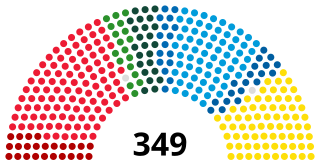
The Riksdag is the legislature and the supreme decision-making body of the Kingdom of Sweden. Since 1971, the Riksdag has been a unicameral legislature with 349 members, elected proportionally and serving, since 1994, fixed four-year terms. The 2022 Swedish general election is the most recent general election.
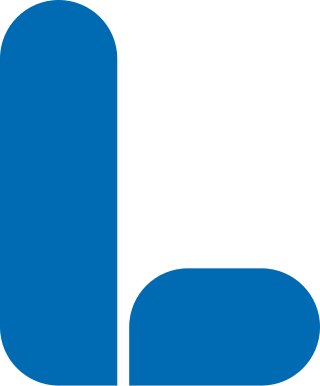
The Liberals, previously known as the Liberal People's Party until 22 November 2015, is a conservative-liberal political party in Sweden. The Liberals ideologically have shown a broad variety of liberal tendencies. Currently they are seen as following classical liberalism and economic liberalism, and have been described as being centre-right. The party is a member of the Liberal International and Renew Europe.

The Christian Democrats is a Christian democratic political party in Sweden founded in March 1964. It first entered parliament in 1985, through electoral cooperation with the Centre Party; in 1991, the party won seats on its own. The party leader since 25 April 2015 has been Ebba Busch.
The Green Party, commonly referred to as Miljöpartiet in Swedish, is a political party in Sweden based on green politics.

The Constitutionalist Liberal Party is a political party in Nicaragua.
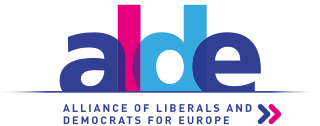
The Alliance of Liberals and Democrats for Europe is a transnational alliance between two European political parties, the Alliance of Liberals and Democrats for Europe Party and the European Democratic Party. ALDE has political groups in the European Parliament, the EU Committee of the Regions, the Parliamentary Assembly of the Council of Europe and the NATO Parliamentary Assembly. There are assorted independents in these groups as well as national-level affiliate parties of the European-level parties.
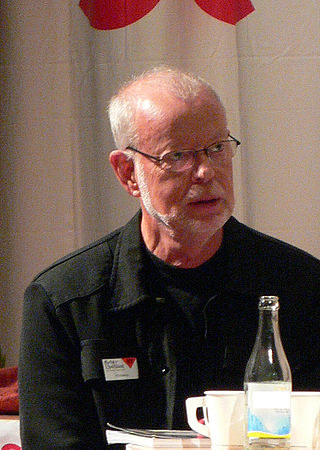
Karl Gustav Hilding Hammar, commonly referred to as K. G. Hammar, is a Swedish clergyman. He was Archbishop of Uppsala, primate of the Church of Sweden, from 1997 to 2006. During his tenure as archbishop he was a highly divisive figure, who gained strong support from some and drew heavy criticism from others, and he oversaw the separation of church and state in Sweden on 1 January 2000. He holds a PhD and is the author of several books on theology.

Fria liberaler i Svenska kyrkan is a nominating group of liberals that work within the Church of Sweden. FiSK is an organizationally autonomous network, previously linked to the Liberals, but since early 2013 independent from that party. The president of FiSK is Olov Lindquist.
The Left in the Church of Sweden is a nominating group of consisting of members of the Left Party that work within the Church of Sweden. In 2001, the Left Party had decided to participate with their own list for the Church Assembly elections. The party only received 1.7% of the vote, and there was a large deal of dissatisfaction within the party concerning one of the assembly members elected, a priest who viewed sex outside of marriage and homosexual relations as "incompatible with his Christian views".
Non-partisans in the Church of Sweden (POSK) is a nominating group working with the Church of Sweden. POSK was founded in 1987 as a platform for independents to contest Church elections. POSK is by far the largest non-party nominating group. POSK is represented in the Kyrkomötet and in all Diocese Assemblies of the country.
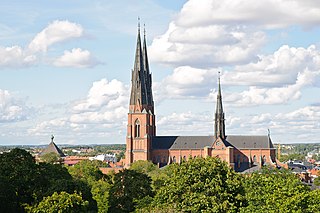
Religion in Sweden has, over the years, become increasingly diverse. Christianity was the religion of virtually all of the Swedish population from the 12th to the early 20th century, but it has rapidly declined throughout the late 20th and early 21st century.
The 1996 European Parliament election in Finland was the first election of the Finnish delegation to the European Parliament.
Frimodig kyrka is a nominating group, which takes part in the church elections in the Church of Sweden. It was founded in 2005 after a split from Non-partisans in the Church of Sweden.
Nomination rules in elections regulate the conditions under which a candidate or political party is entitled to stand for election. The right to stand for election, right to be a candidate or passive suffrage is one part of free and fair elections. Passive suffrage is distinct from active suffrage, the right to vote. The criteria to stand as a candidate depends on the individual legal system. They may include the age of a candidate, citizenship, endorsement by a political party and profession. Laws' restrictions, such as competence or moral aptitude, can be used in a discriminatory manner. Restrictive and discriminatory nomination rules can impact the civil rights of candidates, political parties, and voters.

The 1968 New York state election was held on November 5, 1968, to elect a judge of the New York Court of Appeals and a U.S. Senator, as well as all members of the New York State Assembly and the New York State Senate.
On September 20, 2009, elections were held for all 251 seats in the General Synod of the Church of Sweden. Since the 1930s, nominating groups have often been directly affiliated with national political parties, but many groups are now established separately from political parties.

The Tuve Church is a medieval church in Gothenburg, western Sweden. It is located on the Hisingen island, and it is part of the Tuve-Säve parish.

Skanör Church is a medieval Lutheran church at Skanör in Vellinge Municipality, Skåne County, Sweden. It is associated with the Skanör-Falsterbo parish in the Diocese of Lund within the Church of Sweden.
Alternative for Sweden is a far-right political party in Sweden. It was founded in March 2018 by Gustav Kasselstrand and William Hahne, along with other members of the Sweden Democratic Youth, who were collectively expelled from the Sweden Democrats in 2015. It advocates the forced remigration of immigrants and Sweden's withdrawal from the European Union.